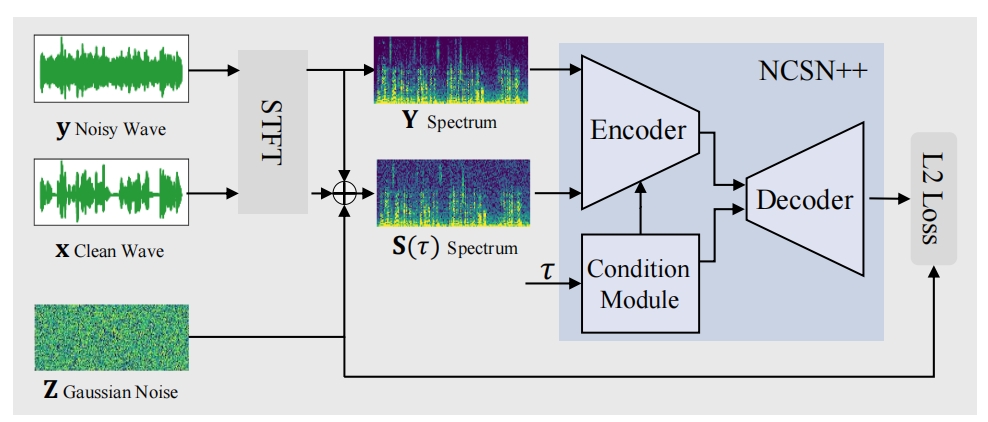Official PyTorch implementation of "A Variance-Preserving Interpolation Approach for Diffusion Models with Applications to Single Channel Speech Enhancement and Recognition" which has been accepted by TASLP 2024. The short version was accepted by Interspeech 2023, found in "variance-preserving-based interpolation diffusion models for speech enhancement", in which we apply the diffusion model to the speech enhancement (denoising) task. (Diffusion Models for Speech Enhancement)
We provide a listening Demo here using the model trained on the DNS corpus.
VPIDM in this project is for single-channel speech enhancement/denoising tasks. Overview of training and inferring stages are presented as follows
Install requirements in requirements.txt via
pip install -r requirements.txt
Prepare your dataset dir in the form of
.../mydataset/train/clean
.../mydataset/train/noisy
.../mydataset/valid/clean
.../mydataset/valid/noisy
Use the following command for training your VPIDM
python train.py --base_dir <your dataset dir, e.g., .../mydataset/ >
--gpus 4
--no_wandb
--sde vpsde
--eta 1.5
--beta-max 2
--N 25
--t_eps 4e-2
--logdir <your log dir>
Our code is also compatible with SGMSE+
python train.py -base_dir <your dataset dir, e.g., .../mydataset/ >
--gpus 4
--no_wandb
--sde ouve
--theta 1.5
--N 30
--t_eps 0.03
--logdir <your log dir>
For denoising via the VPIDM
python enhancement.py --test_dir <test_noisy_dir>
--corrector_step 0
--N 25
--enhanced_dir <outputs_dir>
--ckpt <your checkpoint best.ckpt>
For denoising via the SGMSE+
python enhancement.py --test_dir <test_noisy_dir>
--corrector_step 1
--N 30
--enhanced_dir <outputs_dir>
--ckpt <your checkpoint best.ckpt>
We release the checkpoint trained on the VoiceBank+Demand dataset here.
We release the checkpoint trained on the DNS corpus (only using additive noises) here.
This code is mainly built on the SGMSE+. grateful for their open-source spirit. If you find this project helpful, please kindly cite the following papers.
@misc{guo2024variancepreserving,
title={A Variance-Preserving Interpolation Approach for Diffusion Models with Applications to Single Channel Speech Enhancement and Recognition},
author={Zilu Guo and Qing Wang and Jun Du and Jia Pan and Qing-Feng Liu and Chin-Hui},
year={2024},
eprint={2405.16952},
archivePrefix={arXiv},
primaryClass={eess.AS}
}
@inproceedings{guo23_interspeech,
author={Zilu Guo and Jun Du and Chin-Hui Lee and Yu Gao and Wenbin Zhang},
title={{Variance-Preserving-Based Interpolation Diffusion Models for Speech Enhancement}},
year=2023,
booktitle={Proc. INTERSPEECH 2023},
pages={1065--1069},
doi={10.21437/Interspeech.2023-1265}
}
@article{richter2023speech,
title={Speech Enhancement and Dereverberation with Diffusion-based Generative Models},
author={Richter, Julius and Welker, Simon and Lemercier, Jean-Marie and Lay, Bunlong and Gerkmann, Timo},
journal={IEEE/ACM Transactions on Audio, Speech, and Language Processing},
volume={31},
pages={2351-2364},
year={2023},
doi={10.1109/TASLP.2023.3285241}
}

